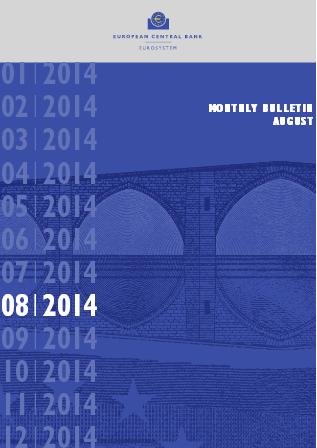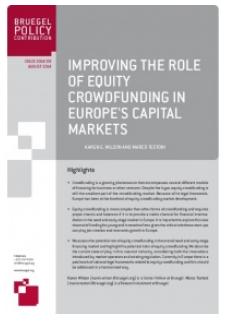European Central Bank (2014) “Monthly Bulletin“, ECB Eurosystem, August. Based on its regular economic and monetary analyses, the Governing Council decided at its meeting on 7 August 2014 to keep the key ECB interest rates unchanged. The available information remains consistent with the Governing Council’s assessment of a continued moderate and uneven recovery of the euro area economy, with low rates of inflation and subdued monetary and credit dynamics. …Read More
Improving the role of equity crowdfunding in Europe’s capital markets
Wilson, Ε. Κ. & Testoni, M. (2014) “Improving the role of equity crowdfunding in Europe’s capital markets“, Bruegel Organisation, 29 August. Crowdfunding is a growing phenomenon that encompasses several different models of financing for business or other ventures. Despite the hype, equity crowdfunding is still the smallest part of the crowdfunding market. Because of its legal framework, Europe has been at the forefront of equity crowdfunding market development. Equity …Read More
European Bond Market: Bubble of all Bubbles!
EconMatters (2014) “European Bond Market: Bubble of all Bubbles!“, Global Market Economics Matters, 27 August. European Bond Rush Right now investors in European Bonds are running over each other all in an effort to front run what the Big Banks have been begging the ECB to begin a bond buying program similar to the United States’ QE bond buying program. Tourism has its Limitations It is hilarious as European …Read More
How to jumpstart the Eurozone economy
Giavazzi, F. & Tabellini, G. (2014) “How to jumpstart the Eurozone economy“, VoxEU Organisation, 21 August. The stagnating Eurozone economy requires policy action. This column argues that EZ leaders should agree a coordinated 5% tax cut, extension of budget deficit targets by 3 or 4 years, and issuance of long-term public debt to be purchased by the ECB without sterilisation. The mantra is that once again it is up …Read More
European Economy, Evaluating Fiscal Policy – A Rule of Thumb
Carnot, N. (2014) “European Economy, Evaluating Fiscal Policy – A Rule of Thumb“, European Commission – Economic Papers 526, August. This paper introduces a simple rule for appraising the economic soundness of fiscal policies. It connects fiscal policy to a long-run debt objective, taken as an anchor, while arbitraging symmetrically between this debt objective and output stabilisation. The rule offers a benchmark to assess the evolution of primary expenditure, …Read More
The role of corporate saving in global rebalancing
Bacchetta, P. & Benhima, K. (2014) “The role of corporate saving in global rebalancing“, VoxEU Organisation, 24 August. Among the various explanations behind global imbalances, the role of corporate saving has received relatively little attention. This column argues that corporate saving is quantitatively relevant, and proposes a theory that is consistent with the stylised facts and useful for understanding the current phase of global rebalancing. The theory implies that, …Read More
Secular stagnation: Facts, causes, and cures
Teulings, C. & Baldwin, R. (2014) “Secular stagnation: Facts, causes, and cures“, VoxEU Organisation Books, 15 August. Six years after the Crisis and the recovery is still anaemic despite years of zero interest rates. Is ‘secular stagnation’ to blame? This column introduces an eBook that gathers the views of leading economists including Summers, Krugman, Gordon, Blanchard, Koo, Eichengreen, Caballero, Glaeser, and a dozen others. It is too early to …Read More
Evaluating the cost of government credit support: the OECD context
Lucas, D. (2014) “Evaluating the cost of government credit support: the OECD context“. Economic Policy, Vol. 29, Issue 79, pp. 553-597. Governments throughout the OECD allocate a large share of societies’ capital and risk through their credit-related activities. Hence, accurate cost estimates for credit support programmes are a prerequisite for efficient resource allocation, transparency, effective management and public oversight. I find that OECD governments generally take their cost of capital …Read More
The role of creditor seniority in Europe’s sovereign debt crisis
Steinkamp, S. & Westermann, F. (2014) “The role of creditor seniority in Europe’s sovereign debt crisis“. Economic Policy, Vol. 29, Issue 79, pp. 495–552. The share of public debt that is held by lenders with preferred creditor status (i.e. the IMF, ECB, ESM, etc.) has increased substantially during Europe’s sovereign debt crisis. Empirically, we document in both macro and survey data that there exists a close relationship between the increase …Read More
Addressing weak inflation: The European Central Bank’s shopping list
Claeys, G., Darvas, Z., Merler, S. & Guntram, B. (2014) “Addressing weak inflation: The European Central Bank’s shopping list“, Bruegel Institute, Policy Contributions, 06 May. There are clear benefits to price stability. High inflation can distort corporate investment decisions and the consumption behaviour of households. Changes to inflation redistribute real wealth and income between different segments of society, such as savers and borrowers, or young and old. Price stability …Read More









